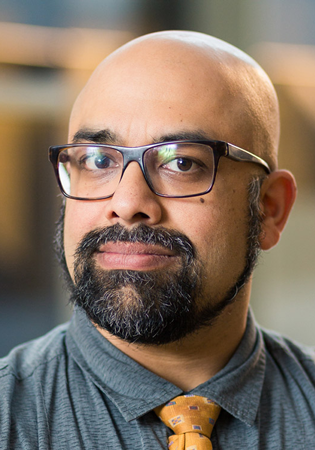The Institute of Islamic Studies (IIS) at the University of Toronto is excited to announce the launch of the Reading Muslim project. The Reading Muslims project, a recipient of the University of Toronto’s Connaught Global Challenge Award, is a multi- and interdisciplinary conversation among leading local and international scholars on the place of textuality in Islamic studies.
The project aims to uncover new insights about the ways textuality — the attributes and characteristics surrounding the writing, reading and interpretation of texts — informs the understanding of Islam in various settings and time periods.
Textuality as a common thread in Islamic studies


The idea was inspired by a seminar on Islamic law at the Institute of Islamic Studies in the fall of 2019. Professors Anver M. Emon (principal investigator) and Youcef Soufi (co-principal investigator) were presenting on the topic of Islamic legal history and soon realized there were broader conversations to be explored.
“During the seminar, we noticed a palpable excitement when the discussion turned to questions surrounding texts and textuality in Islamic studies,” says Emon.
Soufi reflects on how textuality is a consistent thread that animates scholarly debates across the various subfields of Islamic studies.
“The more we thought about the issue, the more we realized textual methodologies were not only a point of commonality, but also at the heart of current tensions within Islamic studies. For example, should Islamic legal texts be studied as artifacts of the past or as living documents that still matter today? What are the methodological consequences of answering the question one way rather than another? And what does the very question say about the pluritemporality, or what we might call the ‘after lives’ of Islamic texts well after they were first written?”
Four perspectives to examine the role of textuality
Reading Muslims is divided into four research hubs. Each hub gathers together researchers and community partners, who examine a set of methodological and political questions around textuality in Islamic studies and its place in the formation of community identities.
- Muslims as Readers focuses on the Muslim construction of textual meanings and the implications of those constructions for Muslim communities;
- National Security and Anti-Muslim Racism is dedicated to highlighting the state’s use and abuse of Muslim texts in bureaucratic, security agency and court contexts;
- Reading Practices explores how philologists and literary scholars should read Islamic texts, let alone characterize them as "Islamic";
- Anthropology of Islam examines the nexus between texts and the anthropological trends in the study of Islam and Muslims.
Student involvement
Reading Muslims is intentional about featuring upcoming scholars from within the University of Toronto and abroad. Drawing on graduate students from across different departments, Reading Muslims offers a platform for these researchers to further develop their written scholarly ideas, form networks and connections with the existing academic community, and develop networking skills that can help position themselves for long-term success in the field.
A cohort of 12 graduate students takes on various roles in the Reading Muslims project as well as contributing, organizing and disseminating original works.
Conversations with networks of scholars across a variety of media
The Reading Muslims project embraces the variety of media channels that enable deep, rich conversations with academics at the University of Toronto and abroad. It features articles, podcasts, videos and working papers (soon to be published).
The variety of formats allows for nuanced conversation and dialogue to emerge among scholars and then amplifies them out to broader audiences for greater participation.
Some of the content available on the project’s web platform are:
- Articles
- Natasha Bakht’s “Reading the Niqab: A Shifting Signifier?", which offers a more thoughtful and nuanced reading of niqab-wearing women.
- Joud Alkorani’s “Reading Muslim Anthropologists" reflects upon how Muslim anthropologists researching Muslim societies are read in light of anthropological debates on positionality and "native" anthropology.
- Aaisha Salman’s “Queer and Muslim: Beyond the Normative Dilemma" offers an examination of queering Islam through not only textual "recovery" but through collectivity.
- Podcast episodes
- Elizabeth Shakman Hurd: Religious Freedom and the Politics of Islamic Reform discusses state surveillance of Muslims within the American context and its implications for the way Islamic texts are read.
- Suzanne Conklin Akbari: The Politics of Reading Practices looks at the different ways that Islamic texts have been read traditionally and how these practices change the way we approach Islamic studies as a field.
- Haytham Bahoora: Theorizing the Making of a Modern Arabic Literary Tradition examines the shift in modern Arabic literature as a result of the Nahda and its consequences on modern reading practices.
- Nada Moumtaz: Forms of Textuality in Anthropology discusses differing approaches to methods and ethnography, and the place of textuality within the field of anthropology.
- Videos
- Reading Muslims Launch Webinar features Dr. Anver Emon, Dr. Ruba Kana’an, Dr. Nada Moumtaz and Dr. Youcef Soufi, and host Joud Alkorani covering the inception of the project and key questions about the role of textuality across different disciplines.
More content is set to be released on a nearly weekly basis as well as a frequent calendar of book talks, discussions and presentations.
A sustainable platform for a long-term project
The launch of the Reading Muslims website is just the beginning of what the Institute of Islamic Studies hopes is a sustained effort to mobilize world-class Islamic studies research through exciting and engaging mediums.
Reading Muslims is the first in a number of projects in which the IIS integrated “design" to translate complex scholarly and academic ideas into engaging communications.

